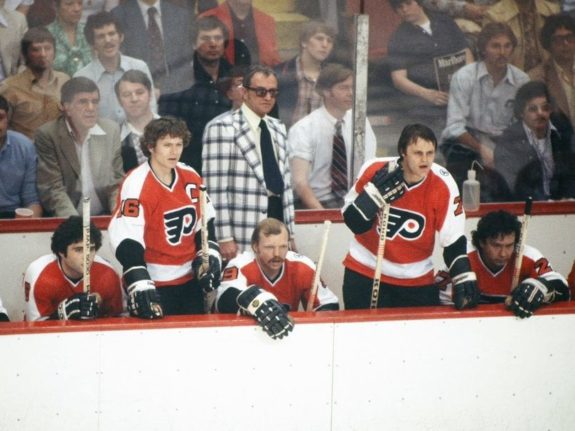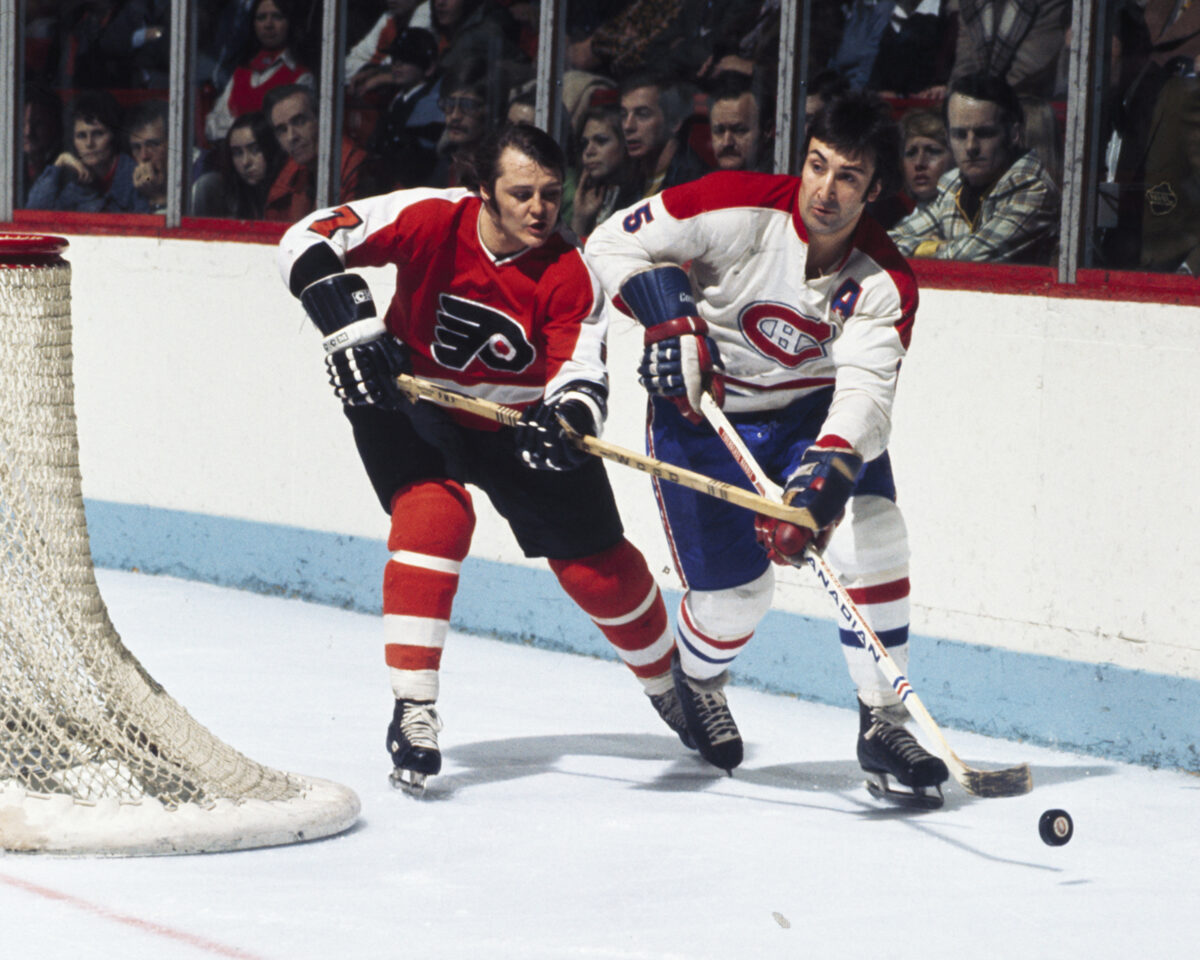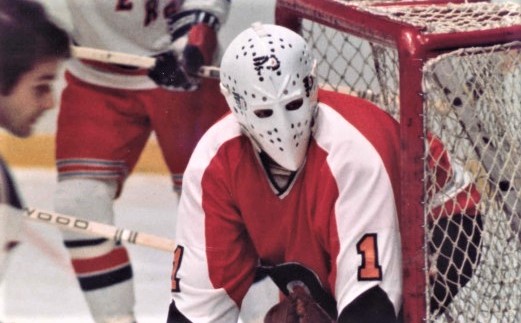In thinking of the Philadelphia Flyers Hall of Fame members, Bill Barber is one that immediately comes to mind — he was one of the first few to be inducted. Spending 12 seasons in the NHL all with Philadelphia, he even got himself into the Hockey Hall of Fame with his 883 career points in 903 total contests.

Looking back at what made Barber special, the high-scoring winger is the all-time franchise leader in goals with 420, which is a mark that might not change for many years. How did he find himself enshrined with the team’s greats?
Barber’s Time in Juniors
As a teenager, Barber was a force in the modern-day Ontario Hockey League (OHL) with the Kitchener Rangers. Most athletes aren’t necessarily at their best in their first taste of Canadian junior action, but he was an exception. He started with an 86-point campaign in 1969-70 through just 54 games, establishing himself as an NHL-level prospect.
Barber’s success continued in both 1970-71 and 1971-72, where he scored 105 and 107 points along with a combined 90 goals. In those two seasons, he had a knack for some feistiness with a total of 218 penalty minutes.
Related: Bobby Clarke: The Ultimate Philadelphia Flyer
By this point, he was able to declare for the 1972 NHL Draft. There were some fantastic players taken in the process like Steve Shutt at fourth-overall to the Montreal Canadiens, but it was the Flyers at seventh-overall that landed Barber. Needing a winger to play alongside center Bobby Clarke who led the team with 81 points and was 32 higher than the man behind him, the man out of Kitchener was their decision. In the end, it proved to be a pretty good one.
Early Playoff Success Follows Barber
It’s not particularly common for a player to come from juniors to dominate right away, but that’s exactly what Barber did. In his first season in the NHL at just 20 years of age, he had 30 goals and 34 assists for 64 points in just 69 games. One of just 33 players to net 30 or more goals that season, it was clear he was becoming something special pretty fast. Although a lot of that had to do with the fact that the second-highest point-getter in the league was Clarke, there was hope in the air.
Before the Flyers’ 1972-73 campaign, they had made the playoffs on three separate occasions, but never won a series. Barber helped change that with five points in his first postseason, scoring five points in 11 contests and helping the Orange and Black win a series. After the team’s only taste of second-round hockey, they soared under his watch.

Barber didn’t improve much as an individual in 1973-74, scoring slightly higher totals of 34 goals and 35 assists for 69 points over 75 games, but he went from a plus-11 rating to a plus-33 from his rookie to his sophomore campaign. Around him, the Flyers became a wagon. They went from 37 to 50 wins, transitioning from a recent expansion team to a full-blown powerhouse.
Barber wasn’t necessarily the usual “Broad Street Bully” in the sense that he put up countless fights and penalty minutes as a result, but he was valuable to the team for his skill and scoring upside. His 34 goals shot him up to being tied for 13th place in the NHL for goals, above greats like Jean Ratelle, Stan Mikita, and a young Marcel Dionne.
The Flyers easily qualified for the postseason and had their way through most of it. Barber wasn’t yet a dominant force in the playoffs, but he helped get them to their first-ever Stanley Cup Final against the ever-so-intimidating Boston Bruins. The Flyers historically struggled at Boston Garden, not winning a single game there since Nov. 12, 1967, but all the team needed was a win there in Game 2 to get themselves in the series, and that’s what they did. A game-winning goal from the 21-year-old himself gave the Flyers a 3-1 series lead that took them to the promised land. Barber was a part of history.
Like it was nothing, Barber and the Flyers repeated as champions in 1974-75. He again gradually improved with 71 points this time around and beat his career playoff point total of 14 in his first two seasons with 15 this time. Still, this improvement doesn’t necessarily justify him being in the Hockey Hall of Fame, let alone the team’s individual Hall of Fame. That was about to change once a new line was formed.
Barber Comes Into His Own
A line with Barber, Clarke, and former Bruin Reggie Leach became the talk of the league in 1975-76. Dubbed the ‘LCB’ line, each of those forwards had the best seasons of their careers when they were together. After scoring 34 goals the season prior, the now 23-year-old exploded for a 50-goal, 112-point campaign. He became one of the best players in the entire NHL in the blink of an eye.

What might be even more impressive is that Barber carried a ludicrous plus-74 rating that season, meaning that he was essentially never scored on as long as he was on the ice. He had 13 points in the playoffs and led them in shots on goal, aiding the team in their run to the Stanley Cup Final for the third straight season. Unfortunately, the Flyers ran into a Montreal Canadiens club on the brink of a dynasty.
Barber’s Final Seasons
Barber cooled off a tad after his 1975-76 season, as did the rest of the team. He had a career-low 55 points in 73 games, scoring 10 fewer goals than his previous worst. Despite this, the Flyers won 48 games and were still one of the best teams in the NHL. They only won a single playoff series this time around, which ironically would have been considered a success a few seasons prior.
Now that the standards were high, Barber kept them that way for many years. The Flyers didn’t quite win another Stanley Cup during his time in Philadelphia, but he was still a consistently great player. A few disappointing playoff seasons in the late 1970s led to a new era of Flyers hockey where he remained. When the 1980s rolled around, he was still performing at an elite level, even picking up his goal and point totals.
Barber was a near-point-per-game player every season following his 1976-77 campaign, and that helped the team immensely. The Flyers returned to the Stanley Cup Final in 1979-80 after losing franchise legend Bernie Parent who won them those two Stanley Cups as well as several figures on the original and subsequent championship team. The Flyers ended up losing in six games to the New York Islanders in the Final, but he was still finding success despite the team around him changing. He was still just 27, so he had time to win himself another championship.

Barber had 85- and 89-point campaigns as he was nearing his 30s and scoring in the league started to ramp up. He started to miss time by his 1982-83 and 1983-84 seasons, and that’s where his career ended out of the blue. Surgery rendered him unable to return to the sport of hockey, so he had to hang up the skates after his age-31 season with an incredible legacy already left behind.
In the end, Barber deserved his nod into both the Flyers’ and the sport-wide Hall of Fame. It was his former head coach, Fred Shero, who said “Win today and we walk together forever”, but that sentiment remains for him beyond just that roster that took the 1973-74 Stanley Cup. Forever, he will remain in the Flyers’ lore.
